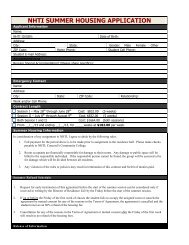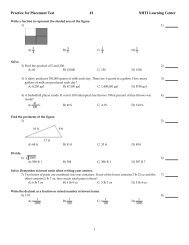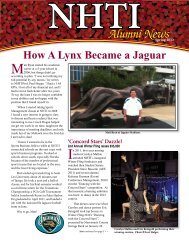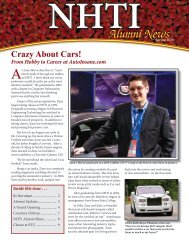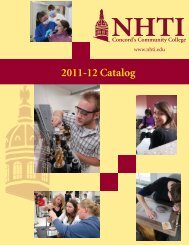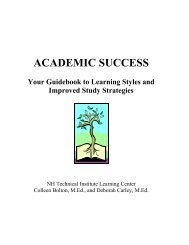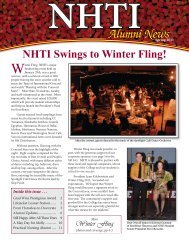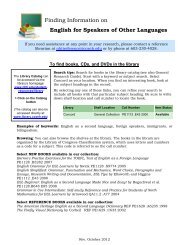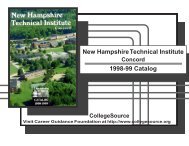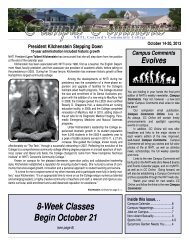Course Descriptions 11-12 - NHTI - Concord's Community College
Course Descriptions 11-12 - NHTI - Concord's Community College
Course Descriptions 11-12 - NHTI - Concord's Community College
- No tags were found...
Create successful ePaper yourself
Turn your PDF publications into a flip-book with our unique Google optimized e-Paper software.
(Students must complete BI 108 with a grade of “C” or higherto progress to BI 109.)BI 109 - Integrated Biology II 2-0-2BI 109 is a continuation of BI 108, picking up where BI 108leaves off in the discussion of the essentials of humananatomy and physiology and microbiology. (Prerequisite:completion of BI 108 with a grade of “C” or higher)BI <strong>11</strong>1 General Biology I 3-2-4Designed to provide the student with the basic principles ofbiology, including scientific method, cell structure, cellularbiochemistry and energy transformations, and genetics.Laboratories are used to develop skills in scientific thoughtand common procedures used in biological experimentation.With BI <strong>11</strong>2, intended to provide a foundation for furtherstudy in life sciences. (Prerequisites: algebra I; high schoollevel biology and chemistry, with labs)BI <strong>11</strong>2 General Biology II 3-2-4A continuation of BI <strong>11</strong>1. Includes a survey of the taxonomicgroupings of life forms, as well as the principles of evolutionand ecology. (Prerequisites: algebra I; high school levelbiology and chemistry, with labs)BI <strong>11</strong>5 Introduction to Ecology 3-2-4This course is designed to give non-science majors anopportunity to learn about the interactions between thephysical and biological components of the environment. Thelecture will provide a broad introduction to the organismal,population, community and ecosystem levels of ecologicalinteraction. Instructional methods include readings,lecture/discussion, in-class applications, field observationsand field research. The lab portion of this course will providestudents with practical experience in ecological methods andin the design, conduct and analysis of ecological studies.Laboratory exercises are designed to correspond with majorlecture topics. Exercises include laboratory and field studies;student should come prepared to be outside for most labs.(Prerequisites: high school biology with lab or BI 100 with agrade of “C” or higher and high school chemistry with lab orCH 100 with a grade of “C” or higher and high school algebraI or MT 103 and MT 104 with grades of “C” or higher)BI <strong>11</strong>6 Field Ornithology 3-2-4This course introduces the student to the biology of birds andthe methods of modern field studies, identification, lifehistories, ecology, and behavior of birds, with an emphasison local species. The course involves a major fieldcomponent (i.e., observing and identifying birds in theirnatural habitats or "birding") complemented byinvestigations into aspects of bird biology and ecology, suchas habitat use, bird morphology and flight, song, nesting andreproductive behavior, and migration. No previousexperience with birds is expected. Lecture and lab mayinclude demonstrations, discussion, and field trips. (Highschool biology strongly recommended or permission of theDepartment Head of Chemistry and Biological Sciences)BI <strong>11</strong>7 Introduction to Plant Biology 3-2-4An introduction to the structure and physiology of plants atthe molecular, cellular and organismal levels; survey of majorplant groups and their evolutionary relationships; and therelationships of plants to humans and other organisms.(Prerequisite: high school level biology with lab with a gradeof “C” or higher or <strong>NHTI</strong>'s BI 100 with a grade of “C” orhigher)BI <strong>12</strong>0 Human Biology 3-2-4A brief summary of human anatomical structure andphysiological systems designed to provide students with theknowledge and perspective necessary to work in their chosenfields. (Prerequisite: high school biology recommended)BI <strong>12</strong>2 Basic Pathophysiology 3-0-3A course designed to provide the student with anunderstanding of the various mechanisms by which humandiseases develop. Includes a survey of common disordersinvolving each of the major body systems. (Prerequisite: BI<strong>12</strong>0 or BI 195 and 196)BI <strong>12</strong>3 The Biology of Human Reproduction (3-0-3)This is an introductory course intended to give anappreciation for the importance of the following areas ofreproduction: male and female anatomy and development,sexual differentiation, puberty, menstruation, parturition,lactation, assisted reproductive technologies, birth controlmethods, and menopause. (Recommended: high school level[or higher] biology)BI <strong>12</strong>5 Human Genetics and Society 3-2-4This course is an introduction to genetics for students notmajoring in the sciences. The student will be introduced tothe basic principles of Mendelian and molecular genetics andwill apply these principles to human genetic traits. Causesand treatments of common inherited diseases will bediscussed as well as genetic technologies and theirapplications (recombinant DNA technology, geneticengineering, in vitro fertilization). The associated ethical andsocial issues will also be examined. Lab component tocomplement lecture. (Recommended: high school level [orhigher] biology)BI 159 Personal Nutrition 3-2-4An introductory course including laboratory for the individualinterested in nutrition as a tool for personal healthpromotion and disease prevention. Incorporates basicprinciples of nutrition with discussions of contemporaryissues. Laboratory exercises allow for exploration of lecturetopics and will include scientific method, food analysis, dietanalysis and nutritional lifestyle analysis. (Prerequisite: highschool biology recommended)BI 180 Tropical Ecology and Conservation 3-2-4This introductory level course is designed to introduce thestudent, through academic study and real experience, to theecology, natural history, and conservation programs at workin Costa Rica. The classroom (on-line) portion of the coursewill prepare the student through studies of major ecologicalprinciples, tropical ecology in general and of Costa Ricaspecifically, and the major ecosystems of Costa Rica. Thehistorical, economic, and cultural aspects of Costa Rica andtheir relationship to resource conservation efforts will beexamined. The culmination of the course will be a nine-day8/17/20<strong>11</strong> <strong>NHTI</strong>, Concord’s <strong>Community</strong> <strong>College</strong> <strong>Course</strong> <strong>Descriptions</strong> 20<strong>11</strong>-20<strong>12</strong> 7



